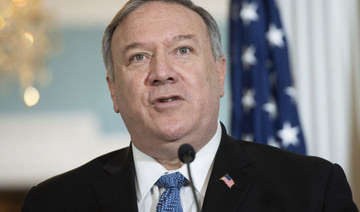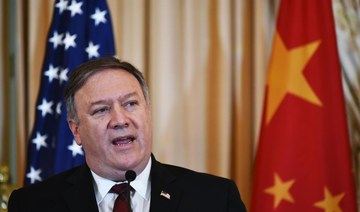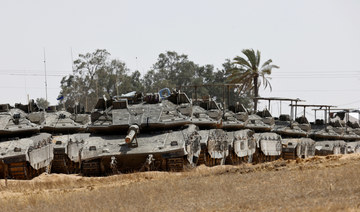TAIPEI: Taiwan President Tsai Ing-wen bestowed a presidential honor on former US Secretary of State Mike Pompeo on Thursday for his contribution to boosting relations with the island, as China’s top newspaper lambasted him again as a “liar.”
China placed sanctions on Pompeo when he left office at the end of the Trump presidency last year, angered by his repeated criticism of the country, especially its ruling Communist Party, and support for Chinese-claimed Taiwan.
Meeting Pompeo at the presidential office in Taipei, Tsai thanked him for his long-time support of Taiwan.
“A visit from such a good friend as Secretary Pompeo attests to the strong Taiwan-US friendship,” she said.
Tsai bestowed on him the Order of the Brilliant Star with Grand Cordon, one of Taiwan’s top honors. Former US Secretary of Defense Donald Rumsfeld is another previous honoree.
Pompeo, wearing a face mask with US and Taiwanese flags emblazoned upon it, said he was proud of his achievements while in office to try and normalize relations with Taiwan, including sending US officials to visit.
“It is not provocative to say that one demands freedom. Indeed to walk away from these things demonstrate the absence of resolve,” he said.
China put sanctions on “lying and cheating” Pompeo and 27 other top Trump-era officials as President Joe Biden took office in January 2021.
China’s top newspaper, the party’s official People’s Daily, called Pompeo in a commentary on Thursday an “extremely notorious” anti-China politician who “took pride in lying and deceit” while in office.
“Collusion with external forces cannot bring security or well-being for the Taiwanese people,” it said of his trip.
The Donald Trump administration gave strong backing to Taiwan, despite the lack of formal diplomatic ties, including high-profile arms sales and visits by top US officials to Taipei.
China has stepped up its military and diplomatic pressure against Taiwan over the past two years, seeking to force the island to accept its sovereignty.
Taiwan’s democratically-elected government says it wants peace but will defend itself if attacked, and that only the island’s people have the right to decide their future.
Taiwan honors former top US diplomat Pompeo, China calls him ‘liar’
https://arab.news/8xa63
Taiwan honors former top US diplomat Pompeo, China calls him ‘liar’
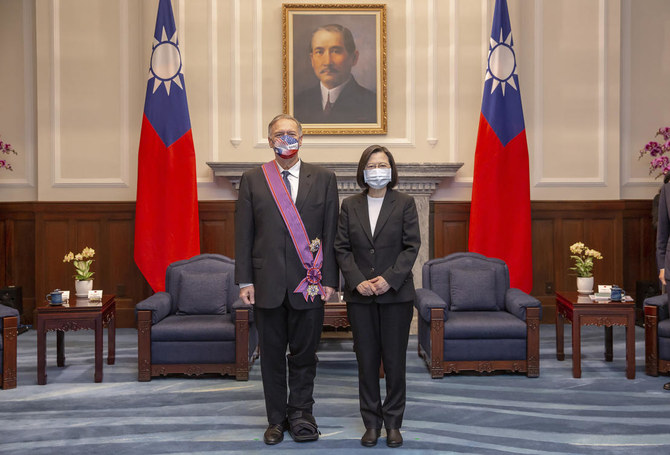
- China placed sanctions on Pompeo when he left office at the end of the Trump presidency last year
India election: Inside Modi and BJP’s plan to win a supermajority
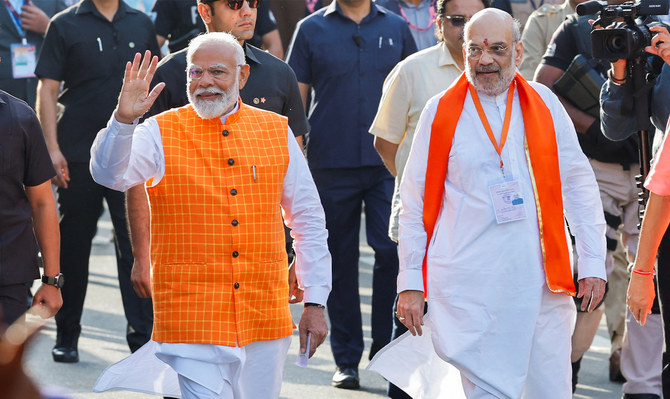
- Hindu nationalist BJP party and its allies are targeting 400 of 543 seats in India’s lower house of parliament
- Only once has a party crossed 400 mark, when Congress won following assassination of Indira Gandhi in 1984
BARPETA/THIRUVANANTHAPURAM, India: As India votes in a six-week general election, Narendra Modi’s image adorns everything from packs of rice handed out to the poor to large posters in cities and towns.
His Bharatiya Janata Party (BJP) is relying on the prime minister’s popularity as it seeks a super-majority in India’s parliament. Its message: Modi has delivered economic growth, infrastructure upgrades and India’s improved standing in the world.
But as the Hindu nationalist party and its allies target 400 of the 543 seats in India’s lower house of parliament — up from 352 won in 2019 — they are also employing local tactics in some vital constituencies they hope to wrest from the opposition.
Opinion polls indicate Modi will win a rare third term when voting ends on June 1. But only once in Indian history has a party crossed the 400 mark — when the center-left Congress party romped to victory following the assassination of its leader Indira Gandhi in 1984.
To examine how the right-wing National Democratic Alliance (NDA) aims to achieve that feat — and the obstacles it faces — Reuters spoke to nine NDA officials, three opposition leaders and two political analysts, as well as voters in six opposition-held seats the alliance is targeting.
They identified three of the BJP’s key tactics: enlisting celebrity candidates to unseat veteran opposition lawmakers; making an assault on the opposition’s southern strongholds by appealing to minorities such as Christians; and exploiting redrawn political boundaries that bolster the Hindu electorate in some opposition-controlled areas in the north.
“A combination of strategies, organizational commitment and tactical flexibility will help make inroads in seats never held by the party ever before,” BJP President J. P. Nadda, who oversees the party’s election strategy, told Reuters in April.
Some critics have warned the BJP would use a large majority to push through a more radical agenda in a third term. While the BJP’s manifesto focuses heavily on economic growth, it has also pledged to scrap separate legal codes for religious and tribal groups in areas such as marriage and inheritance.
Many Muslims and tribal groups oppose the plan, which would require a constitutional amendment to be passed by at least two-thirds of parliament.
“Modi wants a landslide majority only to be able to end the debate and deliberation on any policy matter in the parliament,” Congress party president Mallikarjun Kharge told Reuters.
Following low turnout in early voting, some BJP campaign officials have in recent days appeared less confident of securing a huge majority, though the party still expects to form the next government.
SOUTHERN STRATEGY
Modi’s party has criticized the dynastic politics that it says afflicts Congress, long dominated by the Nehru-Gandhi family. But in Pathanamthitta, a seat in the southern state of Kerala, it is fielding a political scion in Anil Antony — son of a veteran Congress leader.
The constituency, home to a sizeable Christian minority, has been held by Congress since its creation in 2009.
Anil’s father, former defense minister A.K. Antony, supports the incumbent and has denounced his son, a fellow Christian, for representing the Hindu nationalist party.
But Anil has another supporter: Modi, who came to Pathanamthitta in March and praised the BJP candidate for his “fresh vision and leadership.” The prime minister has visited the five states of southern India at least 16 times since December.
Nadda, the BJP president, acknowledged that winning a supermajority would require performing well in the five southern states, which are home to about 20 percent of India’s population but have not traditionally voted for his party.
In 2019, the NDA won just 31 of 130 seats across Andhra Pradesh, Karnataka, Kerala, Tamil Nadu and Telangana, all of which are linguistically diverse and have many Muslim and Christian voters.
Jiji Joseph, general secretary of the BJP’s minority wing in Kerala, said the party has made a concerted push for the 18 percent of voters there who are Christians. The BJP did not win a single seat in Kerala at the last general election.
“The BJP launched active contact with the Church and we started interacting with clergies directly,” he said, adding that the party now has 11,000 active Christian members. “There is a change. Christians now want to believe that BJP stands for them.”
In April, Anil became the first BJP candidate in Kerala to be endorsed by Christian leaders. He told Reuters his selection indicated the party offered opportunities to members from minority groups. He declined to comment on relations with his father.
Jayant Joseph, a Keralan Christian voter, said he backed the BJP because he had read media reports about Muslim men marrying Christian women and converting them to Islam. Most moderate Hindus consider allegations of large-scale forced conversions to be a conspiracy theory.
“Kerala is a secular state,” he said. “But for it to continue to be a secular state, the Muslim population and their conversion strategy must be kept under check.”
A Modi political aide, who spoke on condition of anonymity because he was not authorized to talk to media, said the NDA expects to win about 50 seats in the south.
K. Anil Kumar, a senior leader of Kerala’s ruling Communist Party of India (Marxist), said he did not believe BJP would do well in his state, which he said has a strong tradition of secularism.
“The BJP might try to side with the Christians on some issues but they are fundamentally a party of the Hindus and for the Hindus,” he said.
STAR CANDIDATES
In the Mandi constituency of the northern state of Himachal Pradesh, the BJP has recruited Bollywood actress Kangana Ranaut to break the Congress party’s grip on power. Congress is fielding as its candidate Vikramaditya Singh, whose mother currently represents the constituency. His father was the state’s long-time chief minister.
Ranaut, a political novice who calls herself a “glorious right-wing” personality, has starred in popular movies with nationalistic themes. She is known for her criticism of Bollywood executives who she said favored the relatives of famous actors for opportunities.
The actress is one of five actors running for the BJP this year, up from four in 2019.
No opinion polling on the Mandi race is publicly available.
Anjana Negia, an elementary school teacher who plans to vote for Ranaut, acknowledged that her preferred candidate had no political experience. But she said that she valued a new face and that a Modi-backed candidate would help “bring a fresh wave of development.”
Fielding celebrities and seeking the endorsement of entertainment personalities is relatively new for the BJP, which “long resisted such tactics because of its cadre-based nature” that prized grassroots efforts, said Milan Vaishnav, an expert on South Asian politics at the Carnegie Endowment for International Peace think-tank.
Ranaut declined an interview request. Federal BJP spokesman Shahzad Poonawala said she “has been successful in exposing dynastic culture and nepotism in Bollywood and now she is doing the same in politics.”
Singh, a state minister responsible for urban development, told Reuters that his family’s experiences gave him a better understanding of politics. Charges of nepotism were “shallow,” he said.
REDISTRICTING BENEFITS
The NDA is hoping for gains in the northeastern state of Assam, where it won nine of 14 seats in 2019. Assam’s BJP chief minister, Himanta Biswa Sarma, said in March he was confident of winning 13 seats.
The NDA’s confidence is rooted in a 2023 redistricting exercise in the state. India’s non-partisan Election Commission routinely redraws seat boundaries to reflect population changes; it is tasked with ensuring that no political party gains undue advantage from the changes.
But exercises since the last federal election in Assam and far-northern Jammu and Kashmir, India’s only majority Muslim region, diluted the Muslim vote in seats that the NDA is targeting, according to three BJP and four opposition officials.
The Election Commission declined to comment on the two exercises, citing the ongoing election.
In Assam, the NDA has high hopes for Congress-held Barpeta, which alliance candidate Phani Bhushan Choudhury said newly includes dozens of villages and some towns with large Hindu populations.
“Earlier (Barpeta) had a Muslim majority but now it is a Hindu majority,” said Choudhury. “That change has worked in my favor.”
He estimates that there are now 1.2 million Hindu voters in Barpeta, where he is campaigning on development and protecting the rights of what the NDA calls “indigenous Assamese” voters, who are mostly Hindu.
Choudhury’s Congress opponent Deep Bayan said the percentage of Hindus in Barpeta went from 30 percent to 70 percent. “Instead focusing on real issues affecting the people...(the BJP does) the politics of polarization,” he said.
Three of Jammu and Kashmir’s five seats are majority Muslim and held by the opposition. But the NDA hopes to swing one of them, Anantnag-Rajouri, after its voter rolls swelled by more than 50 percent to over 2 million, according to government data.
Many of the new voters are Hindus or from regional tribes — which benefited from new BJP policies awarding them education and employment privileges — according to regional BJP chief Ravinder Raina.
Raina said the BJP would support an NDA partner that it believed could win Anantnag-Rajouri and focus on retaining the two Hindu-majority seats it holds.
The two redistricting exercises presages a broader remapping of constituencies due after the election.
Vaishnav, of the Carnegie Endowment, said the remapping would distribute seats to the BJP-dominated north, which has much higher population growth rates, to the detriment of wealthier south India.
Indian PM Modi says he does not oppose Islam, Muslims as election campaign heats up
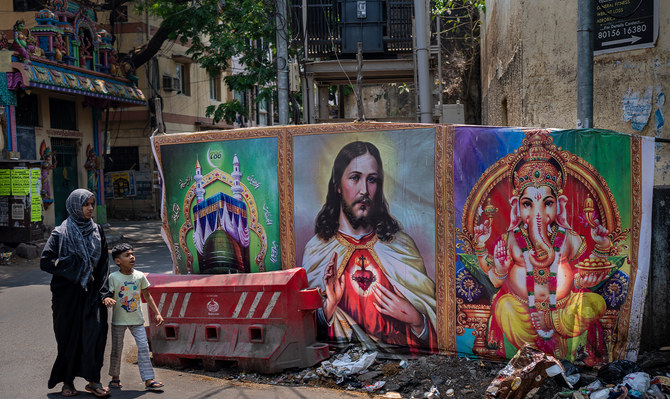
- Modi’s critics accuse him and his party of targeting India’s minority Muslims for electoral gains
- Allegations grew after Modi referred to Muslims recently as “infiltrators” who have “more children”
NEW DELHI: Indian Prime Minister Narendra Modi has said he does not oppose Islam or Muslims and wants the community to think about their future growth as they vote in an ongoing general election that completes its third phase on Tuesday.
Modi’s critics accuse him and his party of targeting minority Muslims for electoral gains and the allegations grew after Modi referred to Muslims in a recent speech as “infiltrators” who have “more children.”
He denied discriminating against Muslims and has linked his recent comment to what he described as the opposition Congress party’s election plan to redistribute the wealth of majority Hindus among Muslims. The Congress denies making any such promise.
“We are not opposed to Islam and Muslims,” Modi told broadcaster Times Now in an interview aired on Monday. “The opposition is looking after its own benefit. Muslim community is intelligent... the opposition is worried that their lies have been caught.”
Modi is seeking a rare third straight term in the seven-phase election that started on April 19 and ends on June 1. Eleven states and territories will vote in the third phase on Tuesday and surveys suggest Modi will win comfortably when results are declared on June 4.
His campaign began by showcasing economic achievements of the past 10 years but changed tack after the first phase of voting and focused more on firing up his Bharatiya Janata Party’s Hindu base by attacking rivals as pro-Muslim.
“I want to say to the Muslim community: introspect, think. The country’s progressing, if you feel any shortcomings in your community, what is the reason behind it? Why didn’t you get government benefits in the time when Congress was in power?“
Analysts say Modi and his Hindu nationalist party have made controversial remarks to invigorate their hard-line base as the election sees comparatively low voter turnout from previous years. Surveys say jobs and inflation are the main concerns of voters.
“Think of your children and your own future,” Modi said, referring to Muslims and the elections. “I don’t want any community to live like laborers because someone is scaring them.”
PM Modi votes as India’s marathon election heats up

- Modi’s ruling Bharatiya Janata Party is expected to win India’s election convincingly
- Indian PM has stepped up rhetoric on India’s main religious divide in bid to rally voters
AHMEDABAD, India: Hindu nationalist Prime Minister Narendra Modi cast his ballot Tuesday in India’s ongoing general election after giving several inflammatory campaign speeches accused of targeting minority Muslims.
Turnout so far has dropped significantly compared with the last national poll in 2019, with analysts blaming widespread expectations that Modi will easily win a third term and hotter-than-average temperatures heading into the summer.
Modi walked out of a polling booth early morning in the city of Ahmedabad while holding up a finger marked with indelible ink, flanked by security personnel and cheered by supporters.
“Voted in the 2024 Lok Sabha elections,” Modi said on social media platform X, referring to India’s lower house of parliament.
“Urging everyone to do so as well and strengthen our democracy.”
The premier’s ruling Bharatiya Janata Party (BJP) is expected to win the election convincingly, but since the vote began on April 19, Modi has stepped up his rhetoric on India’s main religious divide in a bid to rally voters.
He has used public speeches to refer to Muslims as “infiltrators” and “those who have more children,” prompting condemnation from opposition politicians, who have complained to election authorities.
Modi has also accused Congress, the main party in the disparate opposition alliance competing against him, of planning to reallocate the nation’s wealth to Muslim households.
“This is the first time in a long time that he is so direct,” said Hartosh Singh Bal, executive editor at news magazine The Caravan.
“I haven’t seen him be this directly bigoted, usually he alludes to bigotry,” he added.
“The comments on wealth redistribution are targeting something from the Congress manifesto that just does not exist and that is frankly quite unfortunate.”
Modi remains widely popular a decade after coming to power, in large part due to his government’s positioning the nation’s majority faith at the center of its politics, despite India’s officially secular constitution.
In January, the prime minister presided over the inauguration of a grand temple to the deity Ram, built on the site of a centuries-old mosque razed by Hindu zealots decades earlier.
Construction of the temple fulfilled a long-standing demand of Hindu activists and was widely celebrated across India, with extensive television coverage and street parties.
Modi’s brand of Hindu-nationalist politics has in turn made India’s 220-million-plus Muslim population increasingly anxious about their future in the country.
The election commission has not sanctioned Modi for his remarks despite its code of conduct prohibiting campaigning on “communal feelings” such as religion.
India’s election is conducted in seven phases over six weeks to ease the immense logistical burden of staging the democratic exercise in the world’s most populous country.
Much of southern Asia was hit by a heatwave last week that saw several constituencies vote in searing temperatures.
In the city of Mathura, not far from the Taj Mahal, temperatures crossed 41 degrees Celsius (106 degrees Fahrenheit) on polling day, and election commission figures showed turnout dropping nearly nine points to 52 percent from five years earlier.
An analysis of turnout data published by The Hindu newspaper concluded it was too early to determine whether hot weather was impacting voter participation.
But India’s weather bureau has forecast more heatwave spells to come in May and the election commission formed a taskforce last month to review the impact of heat and humidity before each round of voting.
High temperatures were forecast for several locations voting on Tuesday including the states of Madhya Pradesh and Bihar.
Years of scientific research have found climate change is causing heatwaves to become longer, more frequent and more intense.
More than 968 million people are eligible to vote in the Indian election, with the final round of polling on June 1 and results expected three days later.
Ground invasion of Rafah would be ‘intolerable,’ UN chief warns

- Israel has killed more than 34,700 Palestinians, around two-thirds of them children and women, according to Gaza health officials
UNITED NATIONS, United States: A ground invasion of Rafah would be “intolerable,” UN Secretary-General Antonio Guterres said Monday, calling on Israel and Hamas “to go an extra mile” to reach a ceasefire deal.
“This is an opportunity that cannot be missed, and a ground invasion in Rafah would be intolerable because of its devastating humanitarian consequences, and because of its destabilizing impact in the region,” Guterres said as he received Italian President Sergio Mattarella.
UK military personnel’s data accessed in hack, BBC reports

- MPs could be informed about the development in the Commons on Tuesday
Some personal information in a payroll system used by Britain’s defense department has been accessed in a data breach, the BBC reported on Monday.
The system was managed by an external contractor and no operational Ministry of Defense data was obtained, the broadcaster said, adding that the department took the system off-line immediately.
Information like names and bank details of current and some former members of the Royal Navy, Army and Air Force was compromised, according to the report.
The Ministry of Defense did not immediately respond to a Reuters’ request for comment outside working hours.
MPs could be informed about the development in the Commons on Tuesday, the report added.



